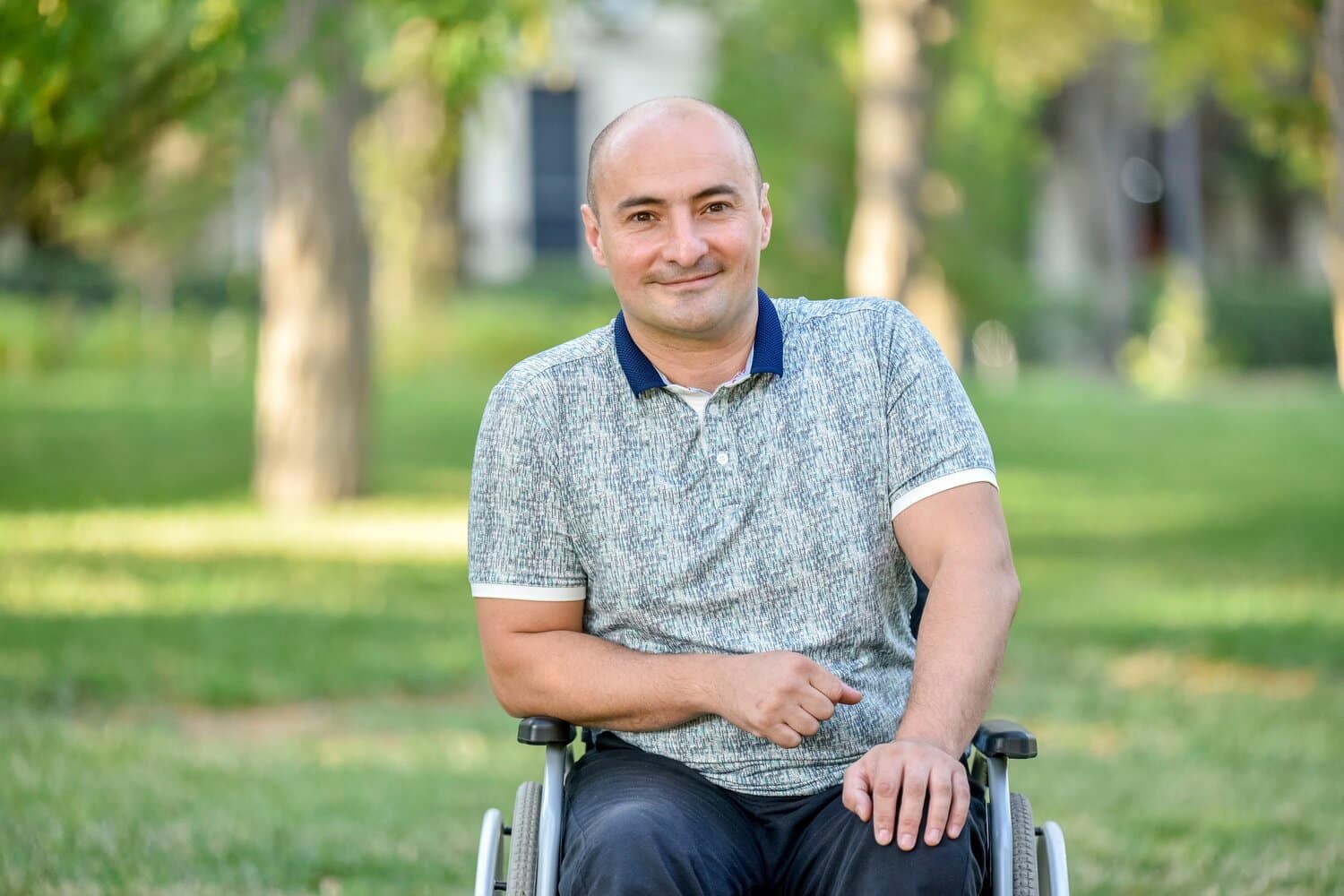
Tinnitus, Mental Health Counselling
At DisabilityPlus, we understand the challenges of living with tinnitus. Our specialised tinnitus counselling provides a safe and supportive space to explore the impact of tinnitus on your life and develop coping strategies to manage its effects.
We’ll help you navigate the emotional and psychological challenges, build resilience, and rediscover a sense of peace and control.
Enquiries
Self-Referral
Lived Experience Matters
Who better understands tinnitus’s challenges than someone who lives with it daily?
Our therapists have personal experience with tinnitus, offering a unique level of empathy and understanding that can be invaluable on your journey to relief.
Tinnitus can be more than just an annoying sound; it can significantly disrupt your daily life.
The constant ringing, buzzing, or hissing can affect your sleep, concentration, and overall well-being.
It can make it difficult to enjoy quiet moments, socialise with friends, or focus on work or hobbies.

Specialist Mental Health Counselling for Tinnitus
We focus specifically on the mental health impact of tinnitus. Our therapists are trained to address this condition’s unique anxieties, stresses, and emotional difficulties.
We don’t just focus on the sound in your ears. We consider the broader impact of tinnitus on your life, including your sleep, relationships, work, and overall well-being.
Our therapists utilise proven therapeutic methods, such as Cognitive Behavioural Therapy (CBT), Mindfulness-Based Stress Reduction (MBSR), and Acceptance and Commitment Therapy (ACT), tailored to the needs of people with tinnitus.

Self-Paid Mental Health Counselling for Tinnitus
Investing in your mental health is an investment in yourself.
While we don’t offer free NHS sessions, our specialist therapy provides unique value to experienced autistic therapists who genuinely understand your needs.
If you’re seeking support without the wait, our self-pay option allows you to begin your journey immediately.
There are no waiting lists or GP reports.
Opting for self-pay for counselling means you can commence your counselling journey typically within a week, offering immediate support when you need it most.
In line with our mission to deliver exceptional counselling, we are acutely aware of the importance of affordability.
Click the “Pricing” tab below for session pricing.
Pricing
Our subsidised rates are designed with your needs in mind:
- £50 first session
- £180 for every three sessions thereafter
These rates are set to reduce financial pressure for our clients.
Enquiries
Self-Referral
Tinnitus & Mental Health?
Living with tinnitus can be a challenging experience beyond the physical sensation of ringing in the ears.
It’s not uncommon for individuals with tinnitus to also face a range of mental health difficulties.
In the following sections, we’ll explore some of the common mental health issues associated with tinnitus, including anxiety, depression, and insomnia, and discuss how our specialist mental health counselling for tinnitus service can provide support and guidance to navigate these challenges.
Anxiety?
The persistent noise of tinnitus can be a significant trigger for anxiety. In its attempt to make sense of the constant sound, the brain can interpret it as a threat, activating the body’s stress response.
This can lead to a vicious cycle where anxiety worsens tinnitus, and tinnitus further fuels anxiety. The unpredictability of tinnitus, with its fluctuating volume and perceived threat, can also contribute to feelings of worry and apprehension.
In counselling for tinnitus, we help clients understand the link between their tinnitus and anxiety.
We provide a safe space to explore their fears and worries and teach coping strategies such as relaxation techniques, mindfulness practices, and cognitive restructuring to challenge anxious thoughts.
By learning to manage their anxiety, clients can often reduce the perceived intensity of their tinnitus and improve their overall well-being.
Depression?
Tinnitus can be a significant contributing factor to depression.
The constant noise can disrupt sleep, leading to fatigue and low mood. It can also lead to social isolation as individuals may withdraw from activities they once enjoyed due to difficulties with hearing or concentration.
The perceived loss of control and the chronic nature of tinnitus can further contribute to feelings of hopelessness and despair.
Mental Health Counselling for Tinnitus can provide crucial support for individuals experiencing depression.
We help clients identify and challenge negative thought patterns, explore their feelings of loss and grief, and develop strategies to cope with the challenges of living with tinnitus.
We also encourage engagement in pleasurable activities and re-establish social connections to combat feelings of isolation and hopelessness.
Insomnia?
Tinnitus can significantly disrupt sleep patterns, leading to insomnia.
The persistent noise can make it difficult to relax and fall asleep, and even when sleep is achieved, it can be fragmented and unrestful. This lack of quality sleep can, in turn, worsen mood, increase anxiety, and impair cognitive function, creating a vicious cycle that further exacerbates tinnitus.
Through Mental Health Counselling for Tinnitus, we help clients establish healthy sleep hygiene practices and develop relaxation techniques to calm the mind and body before sleep.
We also address underlying anxiety and stress that may be contributing to insomnia.
By improving sleep quality, clients often experience a reduction in tinnitus distress and an improvement in their overall quality of life.
Stress?
Tinnitus itself can be a major source of stress.
The constant noise can trigger the body’s stress response, leading to physiological changes such as increased heart rate, muscle tension, and difficulty concentrating.
The perceived lack of control over the tinnitus and the uncertainty about its future can also contribute to stress and overwhelm.
Mental Health Counselling for Tinnitus provides a supportive environment for clients to understand and manage their stress.
We teach stress management techniques such as mindfulness, deep breathing exercises, and progressive muscle relaxation.
We also help clients develop coping strategies to navigate stressful situations and build resilience in the face of challenges.
Irritability and Anger?
Tinnitus’s persistent and intrusive nature can lead to feelings of irritability and anger.
The constant noise can be frustrating and disruptive, making concentrating, relaxing, or enjoying everyday activities difficult.
Over time, this frustration can build up, leading to outbursts of anger or a generally irritable mood.
Mental Health Counselling for Tinnitus helps clients understand and manage their anger healthily. We explore the underlying causes of their anger, teach anger management techniques, and help them develop coping mechanisms to deal with frustration.
By learning to regulate their emotions, clients can reduce the negative impact of tinnitus on their relationships and overall well-being.
Concentration and Memory Problems?
Tinnitus can significantly impair concentration and memory.
The constant noise can be distracting, making it difficult to focus on tasks, conversations, or thoughts.
This can lead to difficulties at work, social situations, and daily life, further increasing stress and frustration.
Through Mental health Counselling for Tinnitus, we help clients develop strategies to improve their focus and attention. We may explore mindfulness techniques, organizational skills, and cognitive exercises to strengthen cognitive function.
We also address any underlying anxiety or stress that may be contributing to concentration difficulties.
Social Isolation?
Tinnitus can lead to social isolation for various reasons.
The difficulty hearing conversations in noisy environments can make socialising challenging and lead to feelings of self-consciousness and embarrassment.
Some individuals may also withdraw from social situations for fear of their tinnitus being noticed or burdening others.
Mental Health Counselling for Tinnitus can help individuals overcome social isolation.
We provide a safe space to discuss their fears and concerns and develop strategies to manage their tinnitus in social settings.
We may also encourage participation in support groups or online communities where they can connect with others who understand their experiences.
Panic Attacks?
For some individuals, the distress caused by tinnitus can be so severe that it triggers panic attacks.
The perceived threat of the constant noise can activate the body’s fight-or-flight response, leading to intense fear, rapid heartbeat, sweating, and difficulty breathing.
Mental Health Counselling for Tinnitus can help clients understand and manage panic attacks.
We teach relaxation techniques, breathing exercises, and cognitive strategies to interrupt the panic cycle.
We also help clients identify their triggers and develop coping mechanisms to prevent future panic attacks.
Transforming Lives Through Tinnitus Counselling
Discover how our specialised support has empowered individuals with tinnitus to find hope, build resilience, and achieve their goals.
My tinnitus was making my job impossible. I couldn’t concentrate, and I was constantly stressed. Sue helped me find ways to manage my tinnitus at work. Now, I feel more focused and confident.
Tinnitus brought me down. I felt hopeless and alone. Matthew helped me understand that I wasn’t alone and gave mesupport to cope with my depression. I’m finally starting to enjoy life again.
The ringing in my ears made me so anxious. I couldn’t relax or sleep. Verity taught me relaxation techniques and helped me change how I think about my tinnitus. My anxiety has improved.
I felt like nobody understood what I was going through with my tinnitus. In counselling, I learned that I’m not alone. Matthew helped me connect with other people with tinnitus, and that’s made a huge difference.
Tinnitus made it hard to do the things I love, like going to concerts and restaurants. Sue helped me find ways to manage my tinnitus in those situations.
My tinnitus was like an emotional rollercoaster. One minute I was fine, the next I was in tears. Verity helped me understand my emotions and gave me the tools to manage them. I feel much more balanced now.
I used to be ashamed of my tinnitus, and I felt it was my fault. Sue helped me accept my tinnitus and see myself in a positive light. Now, I’m learning to live well with it.
My tinnitus kept me up all night. I was exhausted and couldn’t focus during the day. Matthew gave me strategies to quiet my mind and improve my sleep. Now, I’m sleeping better and feeling more alert.

Mobile
01932881849
Self-Pay
Carers
Organisations

Find the Right Support for Your Journey
Select your counselling service
Tinnitus, Mental Health Counselling
Does Tinnitus Impact Your Daily Life?
At DisabilityPlus, we understand the challenges of living with tinnitus. Our specialised tinnitus counselling provides a safe and supportive space to explore the impact of tinnitus on your life and develop coping strategies to manage its effects. We’ll help you navigate the emotional and psychological challenges, build resilience, and rediscover a sense of peace and control.
Therapists with Lived Experience of Tinnitus
Who better to understand the challenges of tinnitus than someone who lives with it every day?
Our therapists have personal experience with tinnitus, offering a unique level of empathy and understanding that can be invaluable on your journey to relief.
We Understand
Tinnitus can be more than just an annoying sound; it can significantly disrupt your daily life.
The constant ringing, buzzing, or hissing can affect your sleep, concentration, and overall well-being.
It can make it difficult to enjoy quiet moments, socialise with friends, or even focus on work or hobbies.
Specialist Counselling for Tinnitus
We focus specifically on the mental health impact of tinnitus. Our therapists are trained to address this condition’s unique anxieties, stresses, and emotional difficulties.
We don’t just focus on the sound in your ears. We consider the broader impact of tinnitus on your life, including your sleep, relationships, work, and overall well-being.
Our therapists utilise proven therapeutic methods, such as Cognitive Behavioural Therapy (CBT), Mindfulness-Based Stress Reduction (MBSR), and Acceptance and Commitment Therapy (ACT), tailored to the needs of people with tinnitus.
Ask us a Question
What Clients Say about us
Counselling Fees
Self-Refer Today
Organisations Referral

Tinnitus Counselling: You Don't Have to Go Through This Alone
It’s okay not to be okay. Living with tinnitus can bring a range of emotions – frustration, sadness, anxiety, or even anger. These feelings are completely normal.
At DisabilityPlus, we understand. Our tinnitus counsellors have lived experience with tinnitus, so we truly understand the challenges you’re facing. We know what it’s like to feel overwhelmed, isolated, and unsure of where to turn.
We offer a safe and supportive space to explore your feelings and find ways to navigate the complexities of life with tinnitus. Our tinnitus counselling services are tailored to your individual needs.
Living Well with Tinnitus: Building Confidence and Self-Acceptance. We’ll help you develop self-acceptance, build confidence, and celebrate your strengths in the face of tinnitus. The sounds in your ears do not define you. We’ll help you rediscover your inner strength and resilience.
Taming the Emotional Rollercoaster: Strategies for Managing Tinnitus-Related Stress and Anxiety. We’ll provide strategies for coping with anxiety, depression, or frustration, helping you find more peace and joy in your daily life. You’ll learn practical techniques to manage stress, calm your mind, and reclaim control.
Navigating the Challenges of Tinnitus: Sleep, Concentration, and Daily Life. We’ll help you navigate challenges related to sleep, concentration, social interactions, and independence. We’ll explore strategies to improve your sleep, enhance your focus, and manage the impact of tinnitus on your daily activities.
Connecting with Others: Strengthening Relationships in the Face of Tinnitus. We can help you foster healthy communication and connection with family, friends, and romantic partners. We’ll help you express your needs, build stronger relationships, and find support within your social circles.
Living a Fulfilling Life with Tinnitus: Achieving Your Goals and Dreams. We’ll empower you to pursue your dreams and live a fulfilling life despite tinnitus. We’ll help you identify your values, set realistic goals, and create a life that brings you joy and meaning.
Finding Your Voice: Advocating for Yourself and Challenging Stigma. We’ll provide a safe space to process your experiences and develop strategies for advocating for yourself. We’ll help you find your voice, challenge stigma, and educate others about the realities of living with tinnitus.

Session Fees/Pricing
We believe everyone should have access to counselling. That’s why we offer reduced rates to the public, with sessions starting at just £50 for 50 minutes.
Our Fees:
£50 Initial Session
£180 for every three sessions thereafter

Benefits of Self-Paying
Investing in your mental health is an investment in yourself.
While we don’t offer free NHS sessions, our specialist tinnitus therapy provides unique value to experienced therapists who genuinely understand your needs.
If you’re seeking support without the wait, our self-pay option allows you to begin your journey immediately.

Professional Referrals
We proudly collaborate with:
- Employment Support Companies
- Solicitors
- GPs
- Mental Health Providers
- Rehabilitation Centres
- Audiologists
- Schools & Universities
- Charities
And many more Professionals & Organisations to ensure Comprehensive Care for our Clients.
Self-Refer
Self-Refer
Referrals
Transforming Lives Through Tinnitus Counselling
Discover how our specialised support has empowered individuals with tinnitus to find hope, build resilience, and achieve their goals.
My tinnitus was making my job impossible. I couldn’t concentrate, and I was constantly stressed. Sue helped me find ways to manage my tinnitus at work. Now, I feel more focused and confident.
Tinnitus brought me down. I felt hopeless and alone. Matthew helped me understand that I wasn’t alone and gave mesupport to cope with my depression. I’m finally starting to enjoy life again.
The ringing in my ears made me so anxious. I couldn’t relax or sleep. Verity taught me relaxation techniques and helped me change how I think about my tinnitus. My anxiety has improved.
I felt like nobody understood what I was going through with my tinnitus. In counselling, I learned that I’m not alone. Matthew helped me connect with other people with tinnitus, and that’s made a huge difference.
Tinnitus made it hard to do the things I love, like going to concerts and restaurants. Sue helped me find ways to manage my tinnitus in those situations.
My tinnitus was like an emotional rollercoaster. One minute I was fine, the next I was in tears. Verity helped me understand my emotions and gave me the tools to manage them. I feel much more balanced now.
I used to be ashamed of my tinnitus, and I felt it was my fault. Sue helped me accept my tinnitus and see myself in a positive light. Now, I’m learning to live well with it.
My tinnitus kept me up all night. I was exhausted and couldn’t focus during the day. Matthew gave me strategies to quiet my mind and improve my sleep. Now, I’m sleeping better and feeling more alert.


Why Specialist Mental Health Counselling for Tinnitus?
Choosing a specialist counselling service for tinnitus offers distinct advantages over seeing a standard counsellor who may not have specific expertise in this area. Firstly, therapists specialising in tinnitus deeply understand the condition, its various forms, and its impact on mental health.
They are familiar with the unique challenges faced by individuals with tinnitus, including the emotional distress, sleep disturbances, and social difficulties it can cause.
Read more?
This specialised knowledge allows them to tailor therapy to your specific needs, offering targeted strategies and coping mechanisms that a general counsellor might not be equipped to provide.
Secondly, many tinnitus specialists have personal experience with the condition, providing empathy and understanding that can be incredibly validating.
They truly grasp the frustration, anxiety, and sense of isolation that tinnitus can bring.
This shared experience fosters a strong therapeutic alliance built on trust and understanding, allowing you to feel honestly heard and supported.
A specialist can also connect you with valuable resources, such as support groups or tinnitus-specific relaxation techniques, which can further enhance your journey toward managing tinnitus and improve your overall well-being.
Tinnitus & Mental Health?
Anxiety?
The persistent noise of tinnitus can be a significant trigger for anxiety. In its attempt to make sense of the constant sound, the brain can interpret it as a threat, activating the body’s stress response.
This can lead to a vicious cycle where anxiety worsens tinnitus, and tinnitus further fuels anxiety. The unpredictability of tinnitus, with its fluctuating volume and perceived threat, can also contribute to feelings of worry and apprehension.
In counselling for tinnitus, we help clients understand the link between their tinnitus and anxiety.
We provide a safe space to explore their fears and worries and teach coping strategies such as relaxation techniques, mindfulness practices, and cognitive restructuring to challenge anxious thoughts.
By learning to manage their anxiety, clients can often reduce the perceived intensity of their tinnitus and improve their overall well-being.
Depression?
Tinnitus can be a significant contributing factor to depression.
The constant noise can disrupt sleep, leading to fatigue and low mood. It can also lead to social isolation as individuals may withdraw from activities they once enjoyed due to difficulties with hearing or concentration.
The perceived loss of control and the chronic nature of tinnitus can further contribute to feelings of hopelessness and despair.
Mental Health Counselling for Tinnitus can provide crucial support for individuals experiencing depression.
We help clients identify and challenge negative thought patterns, explore their feelings of loss and grief, and develop strategies to cope with the challenges of living with tinnitus.
We also encourage engagement in pleasurable activities and re-establish social connections to combat feelings of isolation and hopelessness.
Insomnia?
Tinnitus can significantly disrupt sleep patterns, leading to insomnia.
The persistent noise can make it difficult to relax and fall asleep, and even when sleep is achieved, it can be fragmented and unrestful. This lack of quality sleep can, in turn, worsen mood, increase anxiety, and impair cognitive function, creating a vicious cycle that further exacerbates tinnitus.
Through Mental Health Counselling for Tinnitus, we help clients establish healthy sleep hygiene practices and develop relaxation techniques to calm the mind and body before sleep.
We also address underlying anxiety and stress that may be contributing to insomnia.
By improving sleep quality, clients often experience a reduction in tinnitus distress and an improvement in their overall quality of life.
Stress?
Tinnitus itself can be a major source of stress.
The constant noise can trigger the body’s stress response, leading to physiological changes such as increased heart rate, muscle tension, and difficulty concentrating.
The perceived lack of control over the tinnitus and the uncertainty about its future can also contribute to stress and overwhelm.
Mental Health Counselling for Tinnitus provides a supportive environment for clients to understand and manage their stress.
We teach stress management techniques such as mindfulness, deep breathing exercises, and progressive muscle relaxation.
We also help clients develop coping strategies to navigate stressful situations and build resilience in the face of challenges.
Irritability and Anger?
Tinnitus’s persistent and intrusive nature can lead to feelings of irritability and anger.
The constant noise can be frustrating and disruptive, making concentrating, relaxing, or enjoying everyday activities difficult.
Over time, this frustration can build up, leading to outbursts of anger or a generally irritable mood.
Mental Health Counselling for Tinnitus helps clients understand and manage their anger healthily. We explore the underlying causes of their anger, teach anger management techniques, and help them develop coping mechanisms to deal with frustration.
By learning to regulate their emotions, clients can reduce the negative impact of tinnitus on their relationships and overall well-being.
Concentration and Memory Problems?
Tinnitus can significantly impair concentration and memory.
The constant noise can be distracting, making it difficult to focus on tasks, conversations, or thoughts.
This can lead to difficulties at work, social situations, and daily life, further increasing stress and frustration.
Through Mental health Counselling for Tinnitus, we help clients develop strategies to improve their focus and attention. We may explore mindfulness techniques, organizational skills, and cognitive exercises to strengthen cognitive function.
We also address any underlying anxiety or stress that may be contributing to concentration difficulties.
Social Isolation?
Tinnitus can lead to social isolation for various reasons.
The difficulty hearing conversations in noisy environments can make socialising challenging and lead to feelings of self-consciousness and embarrassment.
Some individuals may also withdraw from social situations for fear of their tinnitus being noticed or burdening others.
Mental Health Counselling for Tinnitus can help individuals overcome social isolation.
We provide a safe space to discuss their fears and concerns and develop strategies to manage their tinnitus in social settings.
We may also encourage participation in support groups or online communities where they can connect with others who understand their experiences.
Panic Attacks?
For some individuals, the distress caused by tinnitus can be so severe that it triggers panic attacks.
The perceived threat of the constant noise can activate the body’s fight-or-flight response, leading to intense fear, rapid heartbeat, sweating, and difficulty breathing.
Mental Health Counselling for Tinnitus can help clients understand and manage panic attacks.
We teach relaxation techniques, breathing exercises, and cognitive strategies to interrupt the panic cycle.
We also help clients identify their triggers and develop coping mechanisms to prevent future panic attacks.
Supporting Organisations
Using tinnitus-supporting organisations can provide numerous benefits for individuals affected by tinnitus. Here are some advantages of seeking support from tinnitus organisations:
Education and Information: Tinnitus organisations offer valuable resources and information about the condition, including its causes, management strategies, and treatment options. Being well-informed about tinnitus can empower individuals to better understand their condition and make informed decisions about their care.
Peer Support: Connecting with others who experience tinnitus can be incredibly helpful. Tinnitus organisations often host support groups or online forums where individuals can share their experiences, exchange coping strategies, and provide emotional support to one another.
Coping Techniques: Tinnitus organisations may offer workshops, webinars, or educational materials on coping techniques to manage tinnitus-related stress and anxiety. Learning relaxation techniques, mindfulness, and other coping strategies can improve an individual’s ability to handle the challenges associated with tinnitus.
Read More
Access to Experts: Some tinnitus organisations have partnerships with healthcare professionals and experts specialising in audiology or tinnitus management. This can give members access to accurate and up-to-date advice and guidance from professionals who understand the condition.
Advocacy and Awareness: Tinnitus organisations often work to raise awareness about tinnitus and advocate for better support and resources for individuals affected by the condition. They may collaborate with policymakers, healthcare institutions, and researchers to improve tinnitus management and funding for research.
Research and Clinical Trials: Some tinnitus organisations support research into the causes and treatments of tinnitus. They may also inform their members about opportunities to participate in clinical trials for potential treatments.
Reduced Isolation: Tinnitus can lead to feelings of isolation and frustration, especially if friends and family members don’t fully understand the condition. Joining a tinnitus organisation allows individuals to connect with others who can empathise with their experiences, reducing feelings of isolation.
Confidentiality and Privacy: Tinnitus organisations provide a safe and confidential space for individuals to discuss their concerns and challenges related to tinnitus without fear of judgment or stigma.
Access to Resources: Tinnitus organisations may provide access to information on medical professionals experienced in treating tinnitus, hearing aids, sound therapy devices, and other helpful tools.
Tinnitus UK - Inclusive of Helpline
They are the only UK helpline that is here solely to help people with tinnitus
British Tinnitus Association
Tinnitus Association is an independent charity supporting thousands of people
Hearing Link (Hearing Specialists)
Tinnitus definition – How common is tinnitus? – Types of tinnitus & general information on their products
Our Posts
Find the Right Support for Your Journey
At DisabilityPlus, we understand that every individual’s mental health journey is unique. That’s why we offer comprehensive counselling services designed to cater to your specific needs.
Click & Select your counselling service
Tinnitus, Mental Health Counselling
Does Tinnitus Impact Your Daily Life?
At DisabilityPlus, we understand the challenges of living with tinnitus. Our specialised tinnitus counselling provides a safe and supportive space to explore the impact of tinnitus on your life and develop coping strategies to manage its effects. We’ll help you navigate the emotional and psychological challenges, build resilience, and rediscover a sense of peace and control.
Therapists with Lived Experience of Tinnitus
Who better to understand the challenges of tinnitus than someone who lives with it every day?
Our therapists have personal experience with tinnitus, offering a unique level of empathy and understanding that can be invaluable on your journey to relief.
We Understand
Tinnitus can be more than just an annoying sound; it can significantly disrupt your daily life.
The constant ringing, buzzing, or hissing can affect your sleep, concentration, and overall well-being.
It can make it difficult to enjoy quiet moments, socialise with friends, or even focus on work or hobbies.
Specialist Counselling for Tinnitus
We focus specifically on the mental health impact of tinnitus. Our therapists are trained to address this condition’s unique anxieties, stresses, and emotional difficulties.
We don’t just focus on the sound in your ears. We consider the broader impact of tinnitus on your life, including your sleep, relationships, work, and overall well-being.
Our therapists utilise proven therapeutic methods, such as Cognitive Behavioural Therapy (CBT), Mindfulness-Based Stress Reduction (MBSR), and Acceptance and Commitment Therapy (ACT), tailored to the needs of people with tinnitus.
Ask us a Question
What Clients Say about us
Counselling Fees
Self-Refer Today

Tinnitus Counselling: You Don't Have to Go Through This Alone
It’s okay not to be okay. Living with tinnitus can bring a range of emotions – frustration, sadness, anxiety, or even anger. These feelings are completely normal.
At DisabilityPlus, we understand. Our tinnitus counsellors have lived experience with tinnitus, so we truly understand the challenges you’re facing. We know what it’s like to feel overwhelmed, isolated, and unsure of where to turn.
We offer a safe and supportive space to explore your feelings and find ways to navigate the complexities of life with tinnitus. Our tinnitus counselling services are tailored to your individual needs.
Living Well with Tinnitus: Building Confidence and Self-Acceptance. We’ll help you develop self-acceptance, build confidence, and celebrate your strengths in the face of tinnitus. The sounds in your ears do not define you. We’ll help you rediscover your inner strength and resilience.
Taming the Emotional Rollercoaster: Strategies for Managing Tinnitus-Related Stress and Anxiety. We’ll provide strategies for coping with anxiety, depression, or frustration, helping you find more peace and joy in your daily life. You’ll learn practical techniques to manage stress, calm your mind, and reclaim control.
Navigating the Challenges of Tinnitus: Sleep, Concentration, and Daily Life. We’ll help you navigate challenges related to sleep, concentration, social interactions, and independence. We’ll explore strategies to improve your sleep, enhance your focus, and manage the impact of tinnitus on your daily activities.
Connecting with Others: Strengthening Relationships in the Face of Tinnitus. We can help you foster healthy communication and connection with family, friends, and romantic partners. We’ll help you express your needs, build stronger relationships, and find support within your social circles.
Living a Fulfilling Life with Tinnitus: Achieving Your Goals and Dreams. We’ll empower you to pursue your dreams and live a fulfilling life despite tinnitus. We’ll help you identify your values, set realistic goals, and create a life that brings you joy and meaning.
Finding Your Voice: Advocating for Yourself and Challenging Stigma. We’ll provide a safe space to process your experiences and develop strategies for advocating for yourself. We’ll help you find your voice, challenge stigma, and educate others about the realities of living with tinnitus.

Session Fees/Pricing
Our Fees:
£50 Initial Session
£180 every three sessions thereafter

Benefits
Investing in your mental health is an investment in yourself.
While we don’t offer free NHS sessions, our specialist mental health counselling for tinnitus provides unique value to experienced therapists who genuinely understand your needs.
If you’re seeking support without the wait, our self-pay option allows you to begin your journey immediately.
Transforming Lives Through Tinnitus Counselling
Discover how our specialised support has empowered individuals with tinnitus to find hope, build resilience, and achieve their goals.
My tinnitus was making my job impossible. I couldn’t concentrate, and I was constantly stressed. Sue helped me find ways to manage my tinnitus at work. Now, I feel more focused and confident.
Tinnitus brought me down. I felt hopeless and alone. Matthew helped me understand that I wasn’t alone and gave mesupport to cope with my depression. I’m finally starting to enjoy life again.
The ringing in my ears made me so anxious. I couldn’t relax or sleep. Verity taught me relaxation techniques and helped me change how I think about my tinnitus. My anxiety has improved.
I felt like nobody understood what I was going through with my tinnitus. In counselling, I learned that I’m not alone. Matthew helped me connect with other people with tinnitus, and that’s made a huge difference.
Tinnitus made it hard to do the things I love, like going to concerts and restaurants. Sue helped me find ways to manage my tinnitus in those situations.
My tinnitus was like an emotional rollercoaster. One minute I was fine, the next I was in tears. Verity helped me understand my emotions and gave me the tools to manage them. I feel much more balanced now.
I used to be ashamed of my tinnitus, and I felt it was my fault. Sue helped me accept my tinnitus and see myself in a positive light. Now, I’m learning to live well with it.
My tinnitus kept me up all night. I was exhausted and couldn’t focus during the day. Matthew gave me strategies to quiet my mind and improve my sleep. Now, I’m sleeping better and feeling more alert.

Why Specialist Mental Health Counselling for Tinnitus?
Choosing a specialist counselling service for tinnitus offers distinct advantages over seeing a standard counsellor who may not have specific expertise in this area. Firstly, therapists specialising in tinnitus deeply understand the condition, its various forms, and its impact on mental health.
They are familiar with the unique challenges faced by individuals with tinnitus, including the emotional distress, sleep disturbances, and social difficulties it can cause.
This specialised knowledge allows them to tailor therapy to your specific needs, offering targeted strategies and coping mechanisms that a general counsellor might not be equipped to provide.
Secondly, many tinnitus specialists have personal experience with the condition, providing empathy and understanding that can be incredibly validating.
They truly grasp the frustration, anxiety, and sense of isolation that tinnitus can bring.
This shared experience fosters a strong therapeutic alliance built on trust and understanding, allowing you to feel honestly heard and supported.
A specialist can also connect you with valuable resources, such as support groups or tinnitus-specific relaxation techniques, which can further enhance your journey toward managing tinnitus and improve your overall well-being.
Anxiety?
The persistent noise of tinnitus can be a significant trigger for anxiety. In its attempt to make sense of the constant sound, the brain can interpret it as a threat, activating the body’s stress response.
This can lead to a vicious cycle where anxiety worsens tinnitus, and tinnitus further fuels anxiety. The unpredictability of tinnitus, with its fluctuating volume and perceived threat, can also contribute to feelings of worry and apprehension.
In counselling for tinnitus, we help clients understand the link between their tinnitus and anxiety.
We provide a safe space to explore their fears and worries and teach coping strategies such as relaxation techniques, mindfulness practices, and cognitive restructuring to challenge anxious thoughts.
By learning to manage their anxiety, clients can often reduce the perceived intensity of their tinnitus and improve their overall well-being.
Depression?
Tinnitus can be a significant contributing factor to depression.
The constant noise can disrupt sleep, leading to fatigue and low mood. It can also lead to social isolation as individuals may withdraw from activities they once enjoyed due to difficulties with hearing or concentration.
The perceived loss of control and the chronic nature of tinnitus can further contribute to feelings of hopelessness and despair.
Mental Health Counselling for Tinnitus can provide crucial support for individuals experiencing depression.
We help clients identify and challenge negative thought patterns, explore their feelings of loss and grief, and develop strategies to cope with the challenges of living with tinnitus.
We also encourage engagement in pleasurable activities and re-establish social connections to combat feelings of isolation and hopelessness.
Insomnia?
Tinnitus can significantly disrupt sleep patterns, leading to insomnia.
The persistent noise can make it difficult to relax and fall asleep, and even when sleep is achieved, it can be fragmented and unrestful. This lack of quality sleep can, in turn, worsen mood, increase anxiety, and impair cognitive function, creating a vicious cycle that further exacerbates tinnitus.
Through Mental Health Counselling for Tinnitus, we help clients establish healthy sleep hygiene practices and develop relaxation techniques to calm the mind and body before sleep.
We also address underlying anxiety and stress that may be contributing to insomnia.
By improving sleep quality, clients often experience a reduction in tinnitus distress and an improvement in their overall quality of life.
Stress?
Tinnitus itself can be a major source of stress.
The constant noise can trigger the body’s stress response, leading to physiological changes such as increased heart rate, muscle tension, and difficulty concentrating.
The perceived lack of control over the tinnitus and the uncertainty about its future can also contribute to stress and overwhelm.
Mental Health Counselling for Tinnitus provides a supportive environment for clients to understand and manage their stress.
We teach stress management techniques such as mindfulness, deep breathing exercises, and progressive muscle relaxation.
We also help clients develop coping strategies to navigate stressful situations and build resilience in the face of challenges.
Irritability and Anger?
Tinnitus’s persistent and intrusive nature can lead to feelings of irritability and anger.
The constant noise can be frustrating and disruptive, making concentrating, relaxing, or enjoying everyday activities difficult.
Over time, this frustration can build up, leading to outbursts of anger or a generally irritable mood.
Mental Health Counselling for Tinnitus helps clients understand and manage their anger healthily. We explore the underlying causes of their anger, teach anger management techniques, and help them develop coping mechanisms to deal with frustration.
By learning to regulate their emotions, clients can reduce the negative impact of tinnitus on their relationships and overall well-being.
Concentration and Memory Problems?
Tinnitus can significantly impair concentration and memory.
The constant noise can be distracting, making it difficult to focus on tasks, conversations, or thoughts.
This can lead to difficulties at work, social situations, and daily life, further increasing stress and frustration.
Through Mental health Counselling for Tinnitus, we help clients develop strategies to improve their focus and attention. We may explore mindfulness techniques, organizational skills, and cognitive exercises to strengthen cognitive function.
We also address any underlying anxiety or stress that may be contributing to concentration difficulties.
Social Isolation?
Tinnitus can lead to social isolation for various reasons.
The difficulty hearing conversations in noisy environments can make socialising challenging and lead to feelings of self-consciousness and embarrassment.
Some individuals may also withdraw from social situations for fear of their tinnitus being noticed or burdening others.
Mental Health Counselling for Tinnitus can help individuals overcome social isolation.
We provide a safe space to discuss their fears and concerns and develop strategies to manage their tinnitus in social settings.
We may also encourage participation in support groups or online communities where they can connect with others who understand their experiences.
Panic Attacks?
For some individuals, the distress caused by tinnitus can be so severe that it triggers panic attacks.
The perceived threat of the constant noise can activate the body’s fight-or-flight response, leading to intense fear, rapid heartbeat, sweating, and difficulty breathing.
Mental Health Counselling for Tinnitus can help clients understand and manage panic attacks.
We teach relaxation techniques, breathing exercises, and cognitive strategies to interrupt the panic cycle.
We also help clients identify their triggers and develop coping mechanisms to prevent future panic attacks.

Support for you from Tinnitus Organisations

British Tinnitus Association
Tinnitus Association is an independent charity supporting thousands of people

Tinnitus UK - Helpline
They are the only UK helpline that is here solely to help people with tinnitus
Our Specialist Services
Click to Select




















